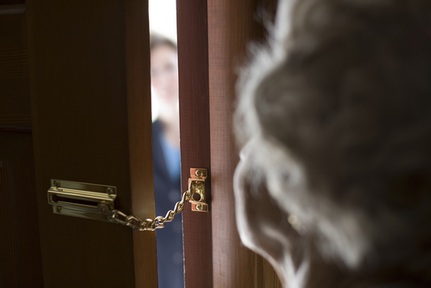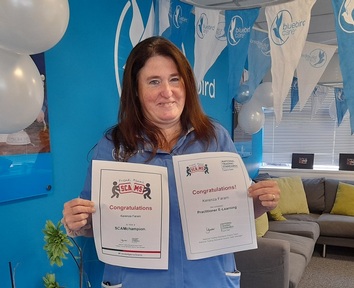Home care worker with fraud expertise helps Bluebird Care warn elderly of scams
To stop elderly people falling victim to fraudsters, a home care worker with a background in fraud analysis has decided to train up colleagues and people reliant on care about the dangers of scams.
 Care assistant Kerenza Faram who works at Bluebird Care North Hampshire & West Berkshire, has been busy alerting the elderly and home care staff about the intricacies of scams.
Care assistant Kerenza Faram who works at Bluebird Care North Hampshire & West Berkshire, has been busy alerting the elderly and home care staff about the intricacies of scams.
As a ‘Scam Champion’ with ‘Friends Against Scams’ - a National Trading Standards scams team initiative - Ms Faram noticed that her skills were required more in her role at Bluebird Care North Hampshire & West Berkshire, as a result of a growing threat of sophisticated, technical scams.
Staff now receive in-depth scam awareness training. Fraud awareness packs are also being delivered to elderly and vulnerable people receiving care at home.
Kerenza Faram personally gives free community presentations and one-to-one talks on scam awareness.
Care worker Kerenza Faram, said: “These sessions are so important for our care assistants to be aware of the type of things to look out for when visiting our customers in their homes, many who live alone.
“Only 5% of scam victims report when they have been scammed because they often feel embarrassment or in complete disbelief. Prevention is far better than cure.”
As a result of Ms Faram's efforts, Bluebird Care North Hampshire & West Berkshire recently got certification as a ‘Friends Against Scams’ organisation.
Emma Holgate, customer supervisor at the Bluebird home care firm, said: “This was such a useful session I learnt so much about the tactics these scammers use.
"We can all be targeted by scammers, not just the elderly. It’s great to be able to offer these free sessions to our customers who are often very vulnerable to scams.”

Criminals 'trick people with flashy, official looking documents'
On its website, Friends against Scams, states: “Scams come in many forms; uninvited contact is received by email, letter, and telephone or in person, making false promises to con victims out of money.
“There are many of these sorts of scams but some of the most common are fake lotteries, deceptive prize draws or sweep stakes, clairvoyants, computer scams, and romance scams.
“The criminals attempt to trick people with flashy, official looking documents or websites, or convincing telephone sales patter, with the aim of persuading them to send a processing or administration fee, pay postal or insurance costs, buy an overvalued product or make a premium rate phone call."
During the pandemic, fake NHS texts targeting care workers and the elderly were circulated. People were told they were eligible to apply for the Covid-19 vaccine. The wording was as follows: 'we have identified that your are eligible to apply for your vaccine'. It then advises you to follow a link to get more information and 'apply'.
But the URL took people through to a very convincing fake NHS website that asks for their personal details - including bank and bank card details.
Number of purchase scams rise before Christmas
In the lead up to Christmas, Southend Trading Standards is now warning about the issue of purchasing scams. In a tweet (@SouthendTS), it revealed: ‘The number of purchase scams often increases at this time of year. Criminals take advantage of those trying to grab a deal on Black Friday or Cyber Monday to trick people.’
Action Fraud (actionfrauduk) has tweeted: ‘Watch out for fake Lidl emails offering a free prize if you complete a survey. The emails link to websites that are designed to steal your personal information.’
With winter here, Age UK warned about a scam phone call that was made by a firm calling itself ‘Vision Homes’, purporting to work for Age UK and offering loft insulation.
The charity advises people to contact Trading Standards and the police, if they think they have been scammed.
Age UK advise people go through a SCAMS checklist:
• STOP – Never do anything you don’t want to or make any decisions on the spot.
• CHECK – Always check their credentials.
• ASK – Always ask someone you trust for a second opinion.
• MINE – Do not give away personal information.
• SHARE – Share your experience with others to lower their risk of being scammed.
click here for more details or to contact Bluebird Care North Hampshire & West Berkshire
Latest News
 29-Jul-24
Dementia Bus gives carehome.co.uk staff insight into life with dementia
29-Jul-24
Dementia Bus gives carehome.co.uk staff insight into life with dementia
 27-Jul-23
UK's top home care agencies in 2023 revealed
27-Jul-23
UK's top home care agencies in 2023 revealed
 30-Nov-22
A quarter of older people keep their falls secret from family
30-Nov-22
A quarter of older people keep their falls secret from family
 29-Nov-22
'Covid-19 has not gone away' say terminally ill
29-Nov-22
'Covid-19 has not gone away' say terminally ill
 28-Nov-22
IT consultant who received poor care opens 'compassionate' home care business
28-Nov-22
IT consultant who received poor care opens 'compassionate' home care business